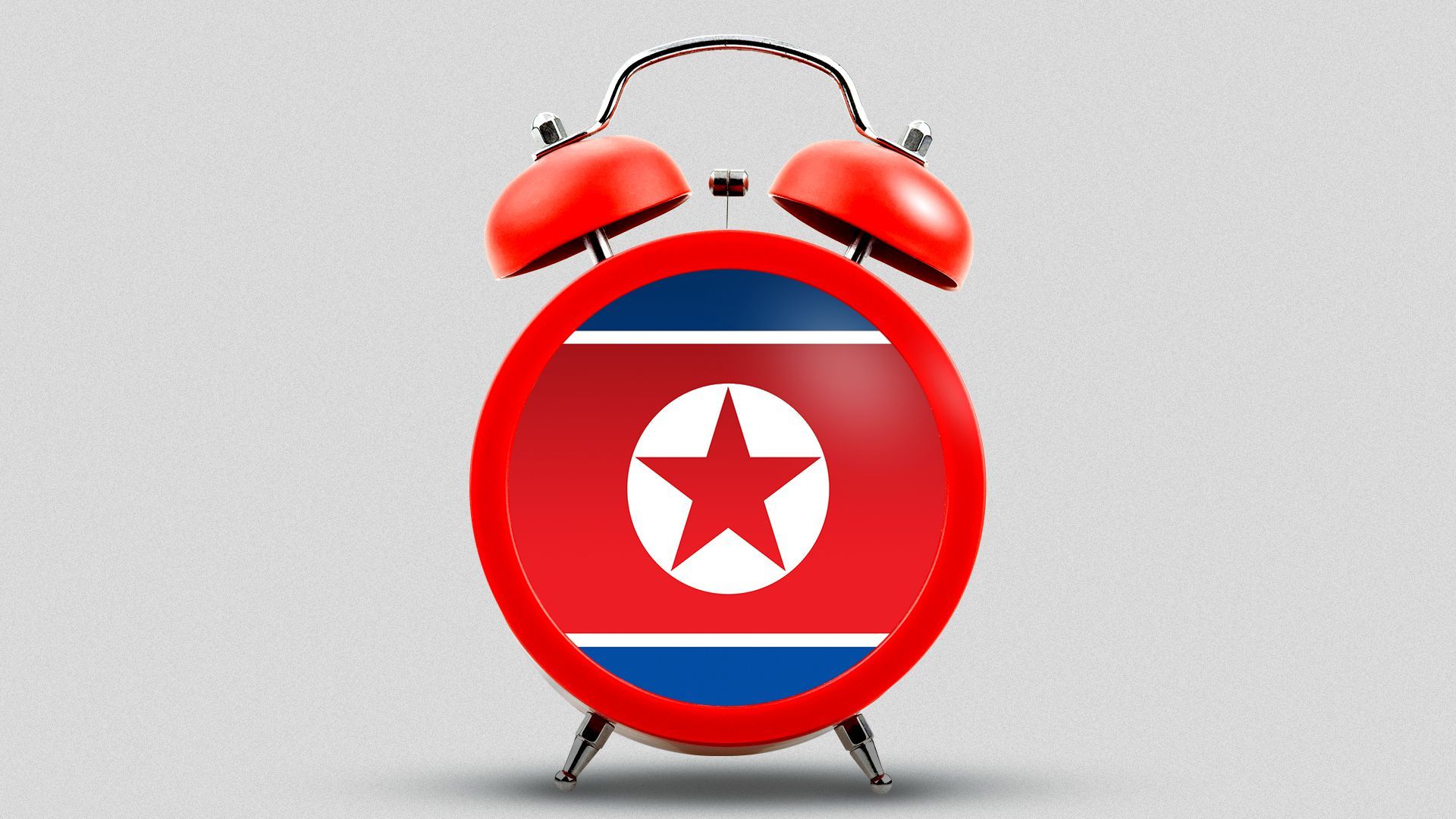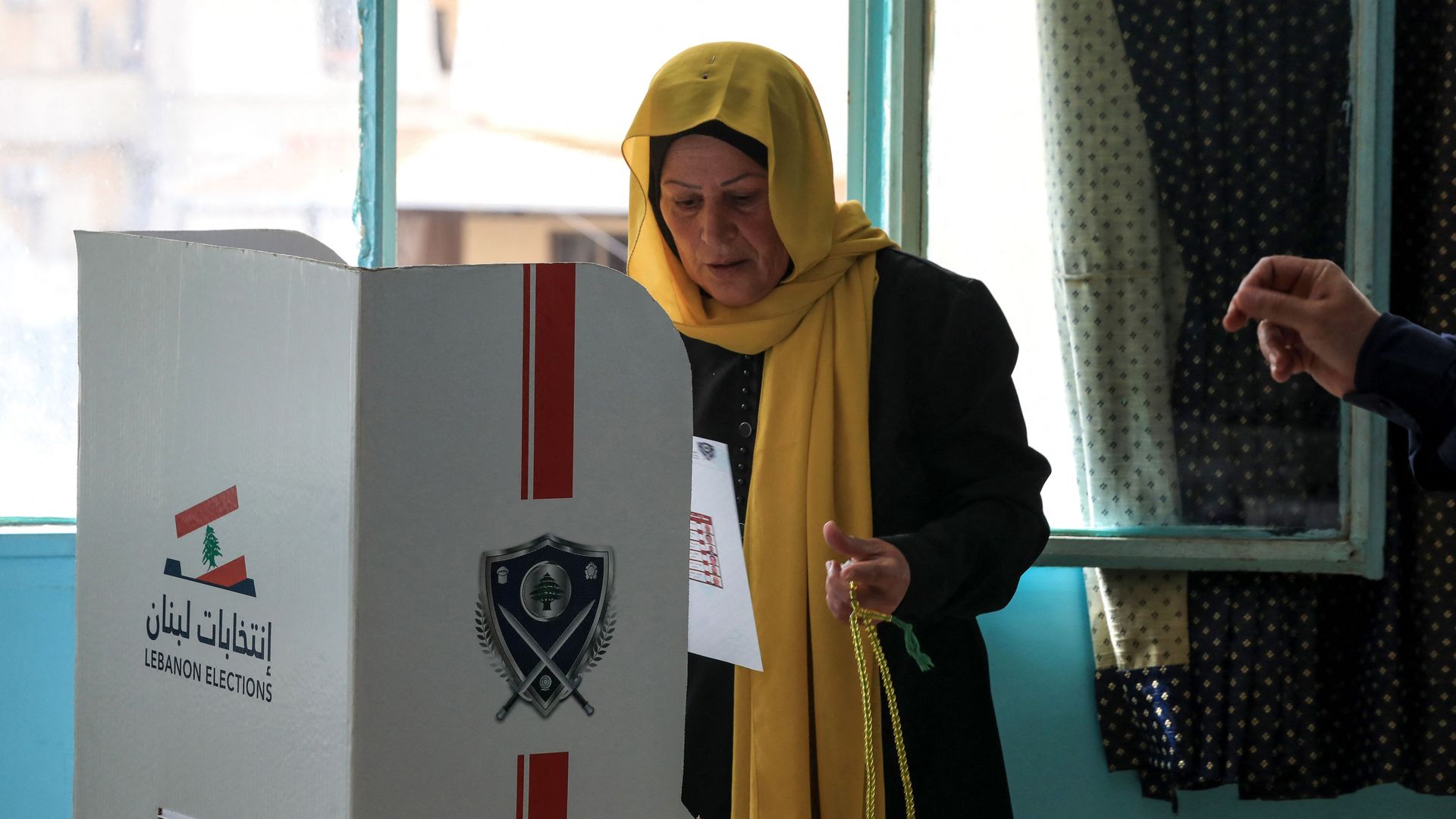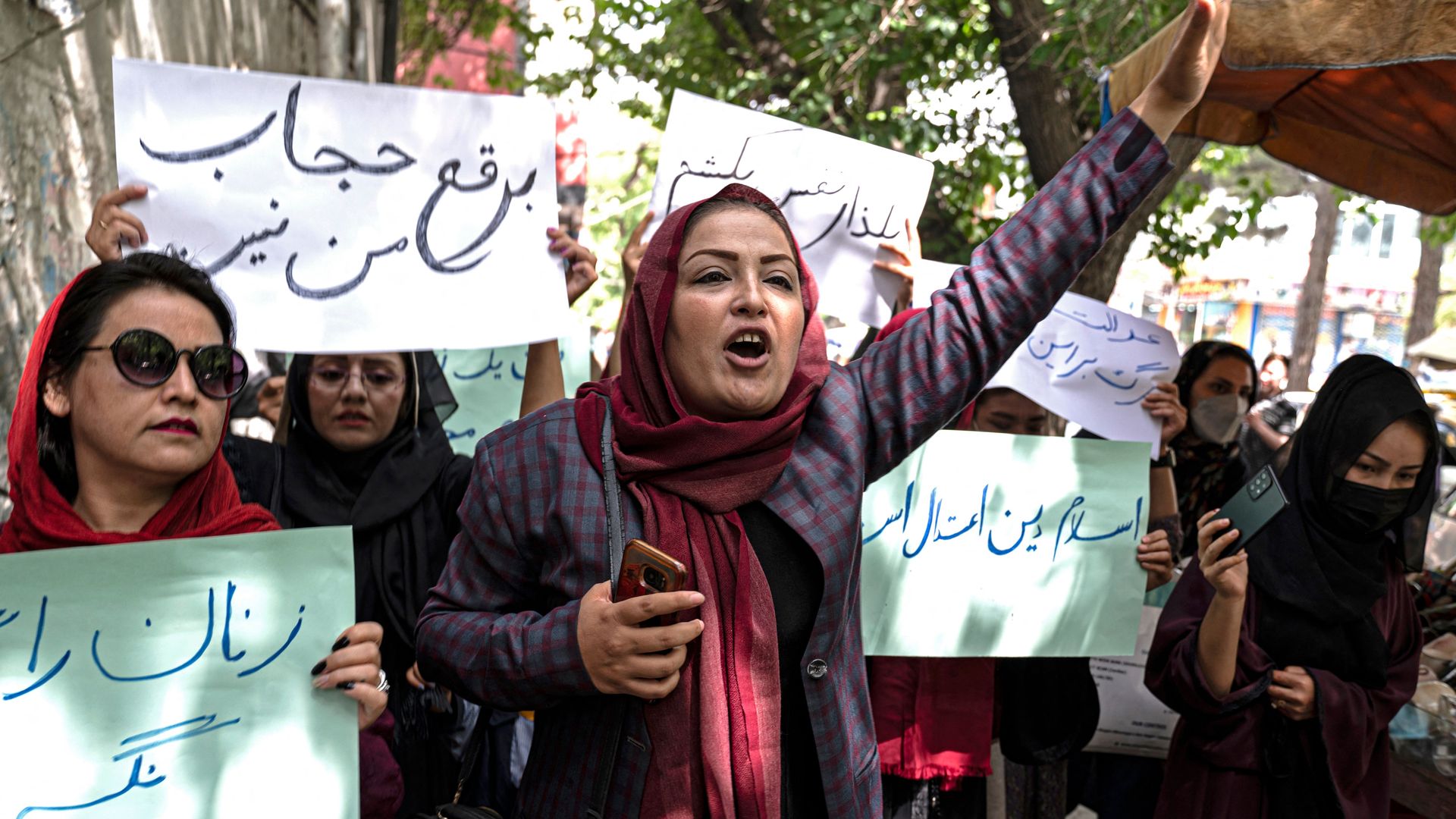| | | | | | | Presented By NetJets | | | | Axios World | | By Dave Lawler · May 16, 2022 | | Welcome back to Axios World. - Tonight (1,809 words, 7 minutes), we're focusing on North Korea's sudden candor about a major COVID outbreak, before making stops in Lebanon, Somalia, Turkmenistan and more.
New arrival? Subscribe. | | | | | | 1 big thing: North Korea's "explosive" outbreak |  | | | Illustration: Annelise Capossela/Axios | | | | North Korea officially had zero COVID cases until last Thursday. Now, Pyongyang says 1.2 million people have feverish, COVID-like symptoms, 50 people have died, and the entire country is under lockdown. Why it matters: North Korea has a 0% vaccination rate and meager health facilities, and it was already struggling to feed its population. Leader Kim Jong-un has called the outbreak the "greatest turmoil" since North Korea's founding, but he has yet to accept foreign assistance. Driving the news: At an emergency Politburo meeting on Sunday, Kim scolded officials for the "irresponsible" execution of the quarantine policy and blamed them for shortages of medicines, according to state media. He has started wearing a mask in public for the first time. - State media reported Thursday that some samples taken from symptomatic people in Pyongyang came back positive for the highly contagious Omicron variant.
- Since then, the number of "fever" cases has ballooned to over 1 million. It's impossible to verify the official figures, and North Korea lacks the capacity for mass testing, but Pyongyang has called the spread "explosive."
Between the lines: "I think there's probably an effort here to get on top of the narrative and to show Kim is addressing this head-on, while also pushing blame down the chain to the lower levels," says Jenny Town, director of the Stimson Center's 38 North program. - State media has acknowledged the virus is spreading in Pyongyang, and "it has probably hit some of the elites," she adds.
- An out-of-control virus is a "nightmare scenario" for the Kim regime and could be a deeply destabilizing event, says Victor Cha, Korea chair at the Center for Strategic and International Studies and a former senior U.S. official.
How it happened: North Korea responded to the pandemic as it did to Ebola, MERS and SARS: "They sealed their borders and waited for the pandemic to die off," says Kee Park, a neurosurgeon and lecturer at Harvard Medical School. - Severing most trade with neighboring China meant taking a major economic hit, and it put the North's ideology of "self-reliance" to the test.
- North Korean officials were highly confident until recently that the "extreme zero-COVID" policy was working, says Park, who has a license to practice in North Korea, has visited more than 20 times, and leads a program to support medical care there.
- "There was really no need, in North Korea's eyes, to entertain external assistance," like the AstraZeneca vaccines offered by the COVAX initiative, he says.
Now that the Omicron variant has "breached their defenses" and spread all around the country, North Korea is ill-equipped to deal with it, Park says. - Even at Pyongyang's top teaching hospital, there are perhaps only a dozen ventilators, he says. Medical facilities outside the capital city are much more limited still.
- North Korea has two things going for it: a high number of doctors per capita and a population that is accustomed to following orders from above, says a humanitarian worker with extensive experience in the country, who requested anonymity due to the sensitivity of the issue.
- But those doctors have limited training and no experience caring for COVID patients. Transportation is so poor, particularly outside of Pyongyang, that it will be difficult to get sick people to hospitals and clinics, particularly during a lockdown, according to the humanitarian source.
The bottom line: "I shudder to think about a prolonged lockdown in North Korea, the human cost of that. The country's already food insecure. And what it means is we have to give them assistance immediately," says Park. |     | | | | | | Part II: Will Kim accept help? |  | | | Kim in 2019. Photo: Mikhail Svetlov/Getty Images | | | | In addition to vaccines and essential medications, North Korea will need food, the humanitarian source says. - "We're coming into the lean season in North Korea, with a drought there and almost no international support. So I'm very concerned."
- "I wouldn't be surprised if there is at least a quiet call for assistance — nothing announced publicly but just done through their diplomatic channels over the next couple of weeks," the source said.
Yes, but: Accepting international aid is always politically sensitive for North Korea, and officials could worry letting in people and supplies will also bring more cases, the Stimson Center's Town says. - "I don't see them suddenly saying, 'Oh, well we have COVID now so let's open everything back up,'" she says. "I think there's still going to be an abundance of precaution, even if it's counter-intuitive and possibly detrimental to the situation."
- North Korea is particularly unlikely to accept direct help from South Korea, which has offered to send vaccines, medical personnel and other needed supplies.
- The WHO said Monday that it had not received any data from North Korea about the outbreak but confirmed that the country had not begun vaccinations.
But the very public pronouncements about the severity of the situation could be a step toward accepting aid, the humanitarian source said, adding that the UN will likely be the key player. - Cha, of CSIS, says that in private communications with nongovernmental organizations and medical groups, North Korea has expressed interest in mRNA vaccines.
What to watch: If North Korea does accept help from South Korea and the U.S., even indirectly through the UN, "it would be interesting to see if this humanitarian effort would sort of open up space for diplomacy on the nuclear issue," Cha adds. |     | | | | | | 3. Global elections roundup |  | | | A Lebanese woman prepares her ballot at a polling station in Beirut's southern suburbs on May 15. Photo: Louai Beshara/AFP via Getty Images | | | | Axios' Laurin-Whitney Gottbrath rounds up the latest global elections news: 1. Lebanon's Iran-backed Hezbollah movement and its allies are expected to lose seats and potentially their majority in parliament, according to preliminary results from yesterday's election, the first since the country's economic collapse began in 2019. - Initial results suggest several anti-establishment newcomers are likely to pick up seats, while a Saudi-aligned party is likely to become the biggest Christian bloc in parliament.
- The projected results foreshadow a "sharply polarized parliament" that "will find it difficult to work together to form a new government and pass the laws needed to enact reforms and begin the country's financial recovery," AP notes.
2. Former Somali President Hassan Sheikh Mohamud will return to the office he was voted out of in 2017 after being elected by lawmakers over the weekend. - Incumbent President Mohamed Abdullahi Mohamed had repeatedly delayed the election, souring relations with the U.S.
- Mohamud, who served as president from 2012 to 2017, faces a worsening security and economic situation and a deepening humanitarian crisis acerbated by a deadly drought.
3. One of Kenya's presidential front-runners, Raila Odinga, has named Martha Karua as his running mate, making the political veteran — nicknamed the "Iron Lady" — the first woman to run on a major Kenyan political party's presidential ticket, per the BBC. - The pair will face front-runner Deputy President William Ruto, who chose MP Rigathi Gachagua as his running mate for the Aug. 9 elections.
4. French President Emmanuel Macron named Labour Minister Elisabeth Borne as the country's new prime minister — only the second time in three decades a woman has been picked for the office — ahead of legislative elections next month. - "I want to dedicate my nomination to all little girls and tell them to go all the way pursuing your dreams," Borne said today.
|     | | | | | | A message from NetJets | | NetJets' impeccable service meets unrivaled performance | | |  | | | | NetJets' unsurpassed safety and service standards are offered on the new Global 7500, the fastest ultralong-range business jet. Rest comfortably in the revolutionary, fully reclining Nuage seats and a private stateroom all your own. Take a tour to experience the NetJets flagship aircraft. | | | | | | Bonus: Where in the world? |  | | | Screenshots via Apple Maps | | | | Today we're visiting eight island countries. Can you name them all? Scroll to the bottom for the answers. |     | | | | | | 4. Sweden and Finland move toward NATO. Erdoğan threatens to stop them |  Data: NATO; Map: Thomas Oide/Axios Sweden's government announced today that it would formally apply for NATO membership, a day after leaders in neighboring Finland took that same step. State of play: The Nordic neighbors are rapidly clearing all remaining hurdles prior to their formal applications, which Secretary-General Jens Stoltenberg has said will be met with "smooth and swift" approval. - Swedish Prime Minister Magdalena Andersson said both Sweden and Finland would apply in the coming days, and that it "shouldn't take more than a year" to be approved.
- "We are leaving one era behind us and entering a new one," she told lawmakers.
Yes, but: In an unexpected twist, Turkish President Recep Tayyip Erdoğan has come out against their applications, a position he reiterated today. - Erdoğan claims they are harboring members of the Kurdistan Workers' Party, which Turkey considers a terrorist group. He also said he'd oppose any applications from countries with sanctions on Turkey.
- It's unclear whether this is a firm position or a negotiating tactic. Secretary of State Tony Blinken said after speaking with his Turkish counterpart that he's confident a consensus can be reached.
Vladimir Putin said today that he sees no "immediate threat" from the pending new round of NATO expansion. - But Putin did say that "the expansion of military infrastructure into this territory would certainly provoke our response."
- Meanwhile, a top Russian diplomat said Moscow wouldn't "simply put up" with this "grave mistake" from Finland and Sweden.
Latest headlines: |     | | | | | | 5. Back behind the veil |  | | | Women in Kabul protest the Taliban's order for women to cover fully in public. Photo: Wakil Kohsar/AFP via Getty | | | | The Taliban is enforcing a new rule that women must be fully covered in public, including their faces. - "It's like being a woman in Afghanistan is a crime," one woman, Sana, told the BBC. She also lost her job after the Taliban takeover.
- "It doesn't matter what they choose for me in terms of dress — I am not leaving my house anyway, the situation is hopeless," she said.
Meanwhile in Turkmenistan, police have been cracking down on beauty parlors since the new president, Serdar Berdimuhamedov, took office, per The Diplomat: - "[S]o-called 'moral police' have instructed women and girls to wear modest clothing, dye their hair black, remove nails and lash extensions and stop getting tattoos. Punishments for infractions range from disciplinary sanctions for civil servants and students to public shaming."
|     | | | | | | 6. One to watch: India bans wheat exports |  Data: Chicago Board of Trade, FactSet; Chart: Simran Parwani/Axios India banned most wheat exports on Saturday after a heat wave drove domestic output down and prices up. - India had previously promised to increase production after nearly all grain exports from Ukraine stopped due to Russia's invasion. Both Russia and Ukraine are major wheat producers.
- Why it matters: As food prices rise around the world due to the war, extreme weather and inflation, more countries are putting these kinds of export controls in place — but that only exacerbates the issue, Axios' Emily Peck reports.
|     | | | | | | 7. Stories we're watching |  | | | A cloud of dust hangs over Baghdad. Photo: Sabah Arar/AFP via Getty | | | - Reversing Trump, Biden approves redeployment to Somalia
- Harris leads U.S. delegation to UAE after president's death
- U.S. to deny entry to some Afghans in Kosovo
- Israeli police beat mourners at Shireen Abu Akleh funeral
- Palestinians mark Nakba Day amid the outrage over her killing
- Ukraine: Seized Russian assets should be used in rebuilding
- Ukraine's Kalush Orchestra wins Eurovision
Quoted: "El Salvador just bought the dip! 150 coins at an average USD price of ~$48,670." — El Salvador President Nayib Bukele on Dec. 4, 2021. Bukele made Bitcoin an official currency last year. "El Salvador just bought the dip! 500 coins at an average USD price of ~$30,744." — Bukele, on May 9, 2022. The country's bitcoin bet has made it likely to default on its debt, per WSJ. |     | | | | | | A message from NetJets | | Fly farther and faster on the NetJets Global 7500 | | |  | | | | NetJets' flagship aircraft offers personalized service and uninterrupted international travel. Among its features: - Four distinct cabin zones and luxury amenities.
- Innovative circadian lighting that helps combat jet lag.
To explore the NetJets flagship aircraft, take a tour now. | | | | Answers: 1. Sri Lanka; 2. Madagascar; 3. Cuba; 4. Iceland; 5. Ireland; 6. Japan; 7. Bahrain; 8. Malta |  | It's called Smart Brevity®. Over 200 orgs use it — in a tool called Axios HQ — to drive productivity with clearer workplace communications. | | | | | | Axios thanks our partners for supporting our newsletters. If you're interested in advertising, learn more here.
Sponsorship has no influence on editorial content. Axios, 3100 Clarendon Blvd, Suite 1300, Arlington VA 22201 | | | You received this email because you signed up for newsletters from Axios.
Change your preferences or unsubscribe here. | | | Was this email forwarded to you?
Sign up now to get Axios in your inbox. | | | | Follow Axios on social media:    | | | | | |












No comments:
Post a Comment